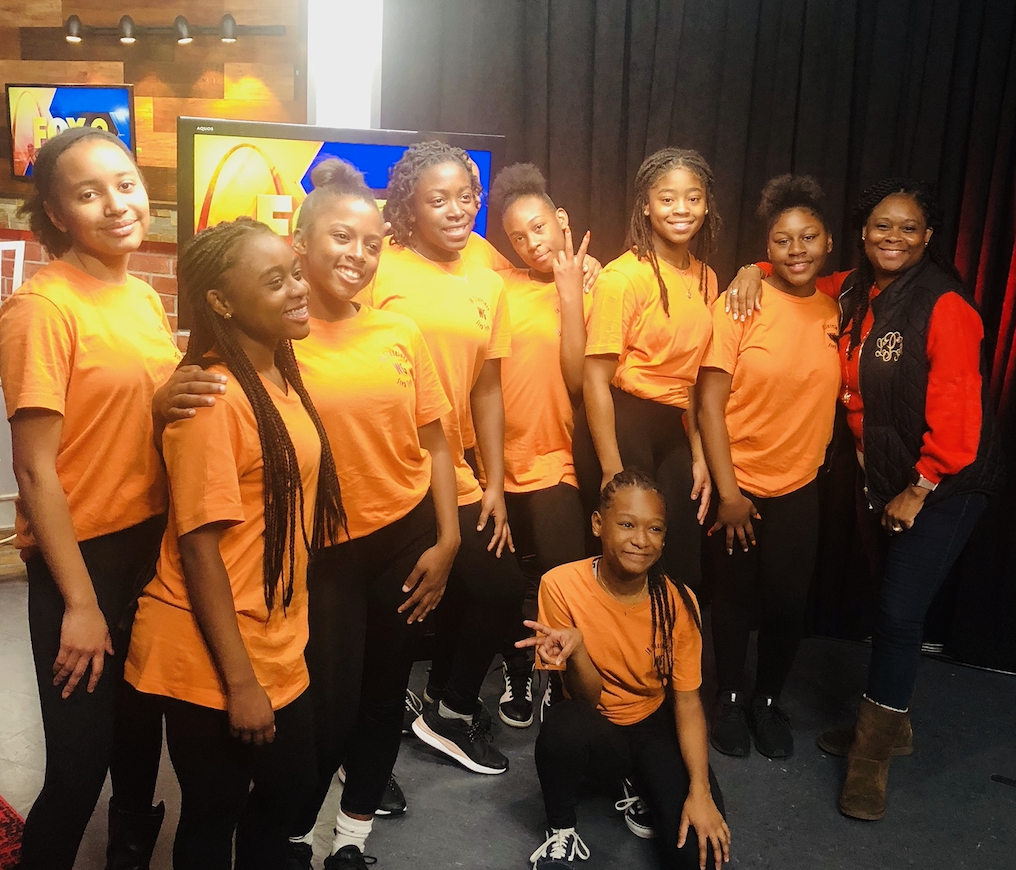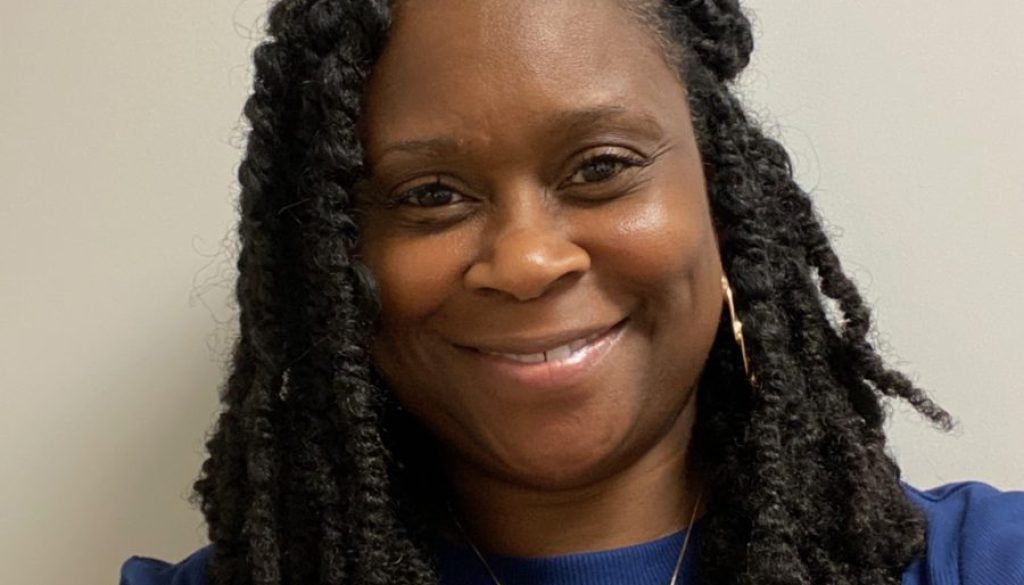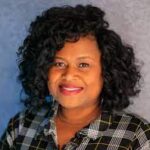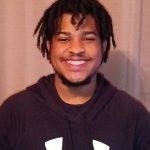‘We can no longer keep listening to lip service and not have any action…’

Dr. Linda Peterson, 49, has worked in the Webster Groves School District 16 years, all at Hixson Middle School. She grew up in a working class family with three older siblings, who moved to Ferguson from St. Louis in 1979. Her experience in mostly white classrooms in Ferguson and the challenges her students at Hixson have faced more recently have shaped her approach to issues around racial equity and inclusion. Along with her duties as a counselor, Peterson takes particular pride in her work as founder and coach for Hixson’s step team, now in its third year. She says the program brings both joy and a sense of solidarity and possibility to her students.
Richard Weiss: Let’s start with your roots. Tell us a little bit about your background, where you grew up and how you got to be a counselor here in the Webster Groves district.
Dr. Linda Peterson: I am native to St. Louis, Missouri. Born and raised in Ferguson as well. I went to school in St. Louis public schools, but when I was much younger, I would say this had to be maybe second, third grade, we moved to Ferguson. And that’s where I graduated from McCluer High School. So my first engagement, authentic engagement, with racism happened in the Ferguson School District.
Weiss: What was Ferguson like back in the day. For you – based on your age — that would have been about 1980 or so.
Peterson: I started at Walnut Grove Elementary. I’ll never forget my first day. My father had dropped me off at the school office with my little Mickey Mouse backpack. He kisses me goodbye and he leaves. I notice no faces look like me. And so I’m sitting there, and I think I sat there maybe an hour before anyone said anything to me.
And I finally said, “I’m hungry.” And the lady was like, “Oh yeah, we need to get you somewhere.” And so then she takes me to a classroom down the hall, and puts me in a classroom. The teacher sits me in the back of the classroom, and again, I’m the only one there that looked like me. She starts giving me all these worksheets. And now, me being in education, my assumption, and this is an assumption not as a child but now, that she was trying to figure out where was I academically, right? As it turned out, they put in a grade level lower for what I was enrolled.
Weiss: Right.
Peterson: What could she start me with? So that’s my assumption. So she starts handing me all these worksheets, and I’m just filling out worksheets, giving it back. And the next thing I know, she’s like, “Well, I’m just going to leave you here for a little bit.” And she goes, and she teaches the other kids.
So by the end of the day I still haven’t eaten This is probably a little bit before school was dismissed. And she’s like, “Oh, well, we forgot.”
At one point she began questioning me about where did I come from, what my parents do, where we live, all these things. And so at the end of the day, I finally got to eat my lunch and then I was dismissed, I was able to go home. And so I couldn’t understand as a second grader, why I could not play with the other kids, why I was not allowed to be at a regular desk and why no one would talk to me.
By the time I got home, I was, of course in tears. They put be on the wrong bus, I’ll never forget that. I got off, and I walked the rest of the way home and I just bawled. And then the next day I remember my angry African-American father going to the school and screaming and yelling in the office.
They were going, “Yes sir. Yes, sir.” And then they put me in a different classroom, which was my grade level. In that classroom there was two or three other kids who looked like me, but I didn’t understand any of that. Again, from a lens of a child. I just didn’t understand why no one liked me. I could not fathom why no one would talk to me. I was put in the corner all day. Like, what did I do wrong?
So that was my first experience with unconscious bias in a school system that said, you are not like everyone else, and they’re going to remind you of that. So from there my parents had to teach me how to navigate. That’s when I started being taught, this is how you navigate these things. And the experience, it did improve, I had solid relationships with peers.
But it wasn’t until high school that I ended up having a teacher that looked like me. And that’s when I finally felt welcomed into a class the first day, no one questioning whether I should be anywhere, At McCluer I had AP and honors classes there, through the National Honor Society.
Weiss: I guess experiences like those put some fire in your belly, didn’t it?

Peterson: Yes. I think that’s why I’m a big advocate of kids knowing and understanding that they need someone who looks like them. Not necessarily to teach them, but they need someone who they can identify with, that they have the eye contact that we do as black people to say, “I’m here. I get it.”
Weiss: Now let’s jump ahead to the present. When the George Floyd killing occurred, when COVID came around, do you feel like it created some momentum for addressing racial equity issues that might not otherwise have been there?
Peterson: I would say 100%, yes. I think overall our African-American, our Brown populations, our minorities, had gotten to a space of they’re like what’s next? We had been heard. I just don’t think we have always been listened to because people can speak to hear or they can speak to listen. We’ve had the conversation but there’s been no accountability to the conversation.
So COVID and George Floyd and Breonna Taylor has had a positive effect. It’s made people stop and consider what has to be done.
Weiss: You also had a racial incident in Webster Groves that had to be addressed. In late February, a white male student had sent a racist meme to two students of color.
Peterson: That was at my school. That was one of my step team girls.
Weiss: How did you react?
Peterson: My first impression, because I got a message from the mom and my principal was, okay, not surprised. And then it was, okay so is he going to get suspended? What’s going to happen, right? I didn’t have any higher expectations of anything fundamentally large happening, because of past experiences of nothing large happening. Typically, I’m considered the crisis counselor. They probably would have had me do a restorative circle. Or we would have the student involved that sent the meme probably would’ve come to me when he came back. And that’s what happened. We were going to do a book study on bias and another book, and I think his parents wanted to meet. And it was going to be the same process of, we’ve done these things and then we’re going to move on.
But because of COVID and then George Floyd, we’ve had time to say, okay, we got to do something different. And I think the voices of the African-American staff that I meet with, we all meet separately quite a few times a year, and we talk and process. We’re like, guys, we can’t stay silent. These things are coming home to roost. It’s time to do something different. We can no longer keep listening to lip service and not have any action. We needed strategic action.
I’m on a committee with a couple of board members and John (Simpson, the superintendent) to literally write policy that’s going to speak to these things. Whether it’s a student, or a staff member, or a community member. And I think having that is what is needed. It’s the accountability and action.
Weiss: These problems are not just confined to students.
Simpson: I can’t even tell you how many incidents I’ve had on my own of being in Webster and feeling not seen, not heard, not validated. No matter how many degrees I have, people will ignore me, and walk past me, and speak to my co-counselor who’s white — she’s my best friend — but they will speak to her and she’ll look at me and I’ll look at her and then she’ll go, “Well you need to ask Dr. Peterson that.”
Okay. So what do we do now? I think because of George Floyd, because of the momentum of the city, because of the momentum of social media for once, the momentum of everyone’s home and having time to deeply actually process what’s been going on in the world, I think that’s what prompted action.
I do believe that John Simpson and our board always want to do what’s right. However, I believe, because again — systemic racism — the board is white, all but one board member; we have a white superintendent, none of these things have been as pressing for those who didn’t have to live it.
Weiss: Tell us more about your work with the step team.
Peterson: I was interested in looking at culturally relevant responsive teaching. And so we started an African-American female step team that would substitute for their regular PE class. Everyday I had the opportunity of working with 23 African-American middle school girls. But we did much more than learn the steps and prepare for competitions. We would embed our social studies, embed our history and have study sessions.
We embed why there’s an achievement gap. We talk about trauma and what it means for African Americans to have toxic stress syndrome. And why is it important to understand the difference between just stress and toxic stress.
I ask the girls how they fit in? How do they identify? What does Webster offer them that they wouldn’t get anywhere else? And working through that, what do they offer Webster that Webster wouldn’t get anywhere else?
Weiss: It makes sense, but that’s really ambitious.
Peterson: Yeah. And unfortunately this would have been our third year of traveling and competition, but because of COVID we have to imagine a new world of what that looks like now. So unfortunately I am not sure we’ll be able to continue to the level, because we literally did some national step competitions and traveled to Louisville, Kentucky. We were scheduled, before COVID hit, for March to do a step competition in Chicago. We also were going to participate with the Parkway School District because they are the model of what a strong program looks like when it comes to the step team. And so we worked with Parkway, the coaches there worked with us to really set that up and get that going. We had a parent engagement, so I had a lot of the African-American parent voices to hear from, because of course, now you have a relationship, right?
Weiss: Many things are on hold with the pandemic, but the work continues, right?
Peterson: Yes, this work definitely needs to continue. Racism has had the space to grow over 250 years with many Breonna Taylors and George Floyds. We can’t get distracted because it’s too important. Everything begins in the mind, what you focus on, you become. As a child I focused on helping others and being taught to advocate for change and now I have a seat at a table where change is being talked about. It’s encouraging, but the work is hard.




